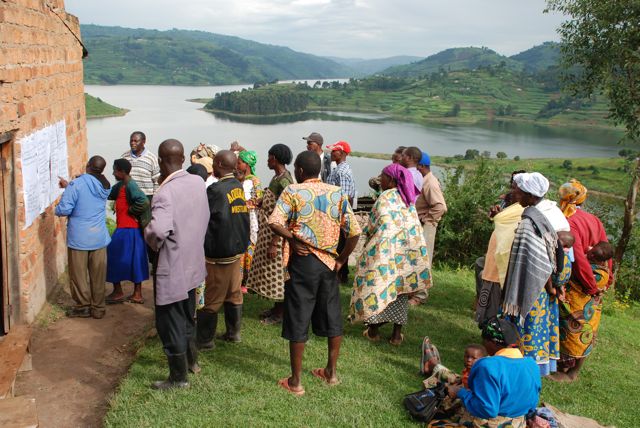Our Programs
Our Programs:
CRD is committed to holistic community-driven projects that improve the social, economic and environmental conditions of smallholder farmers and their communities. By mainstreaming climate change into all aspects of our work we seek to reduce risks and vulnerabilities while promoting integrated agroecological approaches with low carbon development strategies and technologies. Although initially focusing on village-level initiatives, CRD is ultimately interested in developing a landscape-scale project focused on the entire Lake Bunyonyi Watershed.
Our 2012 Workplan includes the following categories:
Natural Resource Management:
Work with farmers at household & village level to promote integrated agriculture, agroforestry and animal husbandry methods that increase production, diversify incomes, and enhance the ecological/environmental conditions within the watershed.
Village Nurseries/Training Schools:
Develop community-based nurseries/training schools in each village. Help establish equitable teams/committees to develop and manage facilities & programs. Concentrate on trees and vegetables. Develop incentives to motivate success and reward innovation. This work is supported by a US Embassy/USAID Small Grant.
Agroforestry – Afforestation & Reforestation:
Pilot small afforestation and reforestation projects within villages. Identify farmers interested and capable of managing sustainable, carbon-based tree planting projects. Explore opportunities to pay farmers for ecosystem and carbon enhancing activities… look for ways to improve entire watershed. This work is supported by Global Green Grants.
Household/Village Nutrition:
Improve nutrition at the household and village level by promoting healthy agricultural- based interventions. Engage the villagers in advancing agroecological techniques (such as permaculture) that improve health & create sustainable livelihoods. Promote kitchen gardens.
Livestock/Animal Husbandry: (pending partner funding)
Begin reintroducing livestock at the household and village level. Develop a holistic framework to ensure livestock are sustainably managed to improve farmer livelihoods and enhance the overall environment. Pending financial partner support.
Low Carbon Development:
Promote appropriate climate change mitigation and adaption measures, specifically promoting low carbon developments pathways and targeted opportunities to mitigate emissions from forestry and agriculture. In regards to agroforestry, examine how carbon-credit programs could help incentivize sustainable forestry. The low-carbon work will benefit from a research project on stoves funded by USAID, implemented by Impact Carbon and researched with the support of the University of Berkeley. This project provides the opportunity for villagers to test the stoves in their homes before purchasing and will provide another means of financing the purchases over several months, both enormous hurdles to overcome in the early deployment of new technologies.
Geographic Information Systems:
Use Geographic Information Systems (GIS) as a foundational planning tool to guide project planning and resource evaluations. Develop the capabilities and use the system for village and watershed based planning, monitoring and evaluation. Pending financial partner support.
